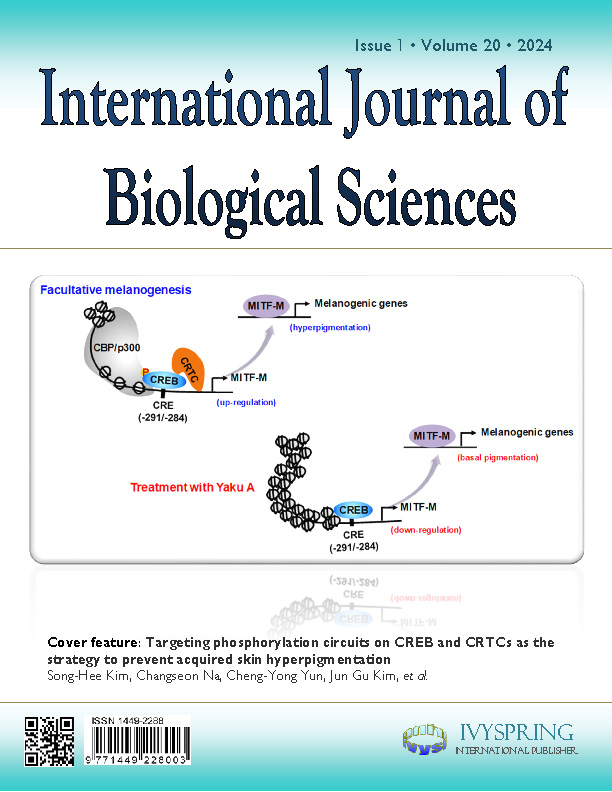SIX4 Activation in Inflammatory Response Drives the Transformation of Colorectal Epithelium into Inflammation and Tumor via Feedback-Enhancing Inflammatory Signaling to Induce Tumor Stemness Signaling
IF 8.2
2区 生物学
Q1 BIOCHEMISTRY & MOLECULAR BIOLOGY
引用次数: 0
Abstract
Some colorectal cancer patients have experienced normal epithelial transformation into inflammatory and tumor states, but the molecular basis still needs to be further determined. The expression levels of SIX4 are gradually increased in dextran sodium sulfate (DSS) and azoxymethane (AOM)/DSS-induced colonic epithelial inflammation and tumors, respectively, in mice. Targeting SIX4 alleviates intestinal inflammation occurrence and reduces adenoma formation in mice. Clinical sample assays indicated that SIX4 is upregulated in inflammatory bowel disease (IBD) and colorectal cancer (CRC) tissues compared to normal colorectal tissues. In a subsequent study, we found that SIX4, transcriptionally activated by the proinflammatory IL-6/STAT3 signal, binds to c-Jun to transcribe IL-6, thus forming a positive IL-6/STAT3/SIX4/c-Jun feedback loop, which further induces intestinal inflammation occurrence. In addition, elevated SIX4 also induces the expression of DeltaNp63, rather than wild-type p63, by binding to its promoter and thus facilitates the activation of tumor stemness signals, which ultimately leads to the formation of colorectal cancer. Our study first observes that activated SIX4 in inflammation induction drives the transformation of colorectal epithelium into inflammation and tumor, which demonstrates SIX4 as a significant therapeutic target in IBD and colitis-associated colorectal cancer (CAC) and CRC pathogenesis./n/n炎症反应中的 SIX4 激活通过反馈增强炎症信号转导肿瘤干性信号转导,驱动结直肠上皮细胞向炎症和肿瘤转化
一些结直肠癌患者的正常上皮会转变为炎症和肿瘤状态,但其分子基础仍有待进一步确定。在右旋糖酐硫酸钠(DSS)和偶氮甲烷(AOM)/DSS诱导的小鼠结肠上皮炎症和肿瘤中,SIX4的表达水平分别逐渐升高。靶向 SIX4 可减轻小鼠肠道炎症的发生并减少腺瘤的形成。临床样本检测表明,与正常结直肠组织相比,SIX4在炎症性肠病(IBD)和结直肠癌(CRC)组织中上调。在随后的研究中,我们发现 SIX4 被促炎性 IL-6/STAT3 信号转录激活,与 c-Jun 结合转录 IL-6,从而形成 IL-6/STAT3/SIX4/c-Jun 正反馈环,进一步诱导肠道炎症的发生。此外,升高的 SIX4 还会通过与其启动子结合,诱导 DeltaNp63(而非野生型 p63)的表达,从而促进肿瘤干性信号的激活,最终导致结直肠癌的形成。我们的研究首次发现,在炎症诱导过程中活化的 SIX4 会驱动结直肠上皮细胞向炎症和肿瘤转化,这表明 SIX4 是 IBD 和结肠炎相关性结直肠癌(CAC)及 CRC 发病机制中的一个重要治疗靶点。
本文章由计算机程序翻译,如有差异,请以英文原文为准。
求助全文
约1分钟内获得全文
求助全文
来源期刊

International Journal of Biological Sciences
生物-生化与分子生物学
CiteScore
16.90
自引率
1.10%
发文量
413
审稿时长
1 months
期刊介绍:
The International Journal of Biological Sciences is a peer-reviewed, open-access scientific journal published by Ivyspring International Publisher. It dedicates itself to publishing original articles, reviews, and short research communications across all domains of biological sciences.
 求助内容:
求助内容: 应助结果提醒方式:
应助结果提醒方式:


